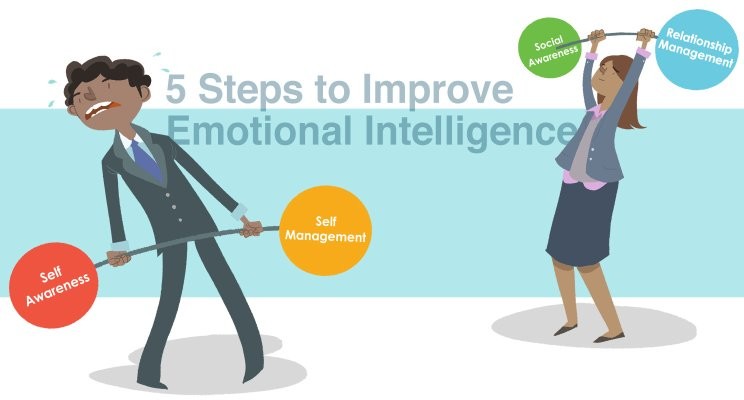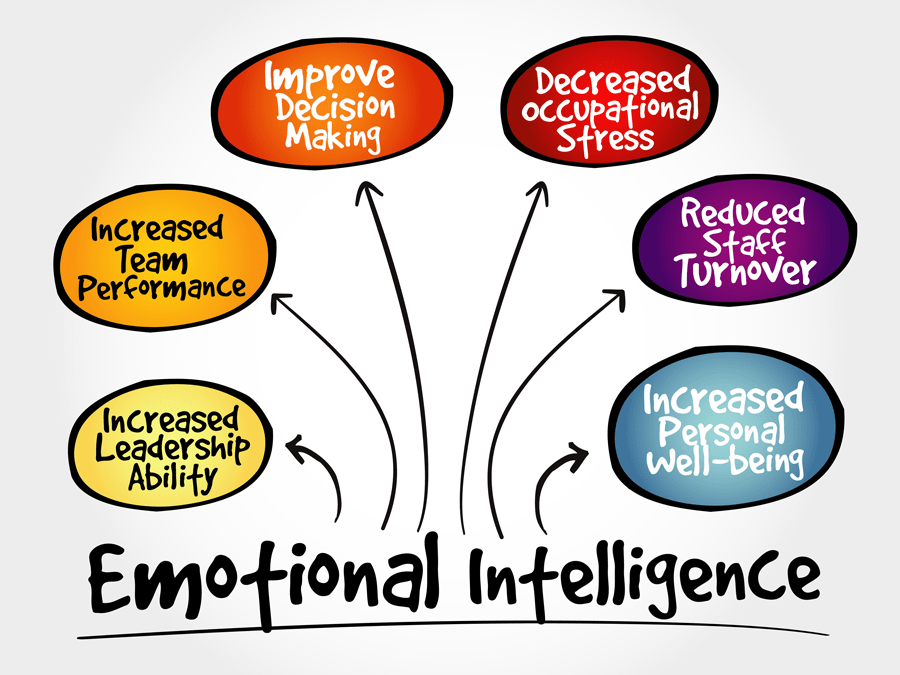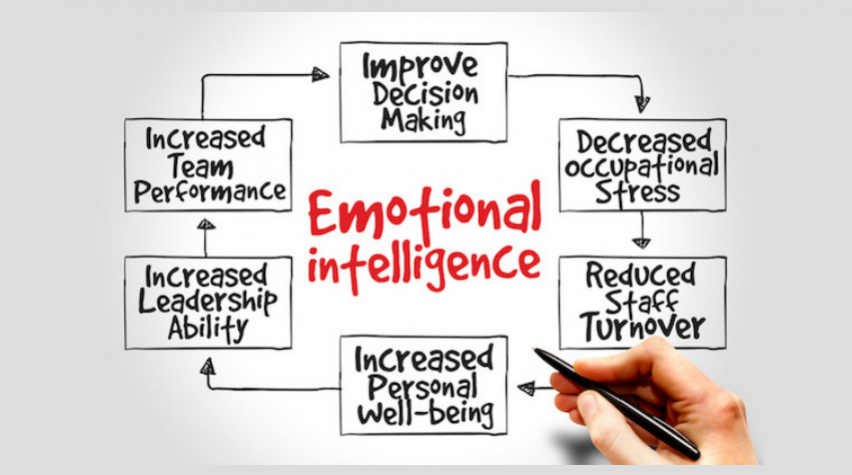To develop emotional intelligence, practice self-awareness and regulate your emotions. Actively listen and empathize with others.
Emotional intelligence is crucial in personal and professional relationships. It involves recognizing and understanding your emotions and those of others. Self-awareness is the first step, as it helps you identify your emotional triggers. Emotion regulation follows, ensuring you respond appropriately in various situations.
Active listening enhances empathy, allowing you to connect deeply with others. Emotional intelligence can improve communication, reduce stress, and foster better decision-making. By developing these skills, you can navigate social complexities more effectively. Practicing these steps consistently will lead to significant growth in emotional intelligence, benefiting all areas of your life.

Credit: www.linkedin.com
Introduction To Emotional Intelligence
Emotional Intelligence (EI) is the ability to understand and manage your own emotions. It also includes recognizing and influencing the emotions of others. This skill is crucial for personal and professional success. People with high EI handle stress better and maintain healthy relationships.
Importance In Daily Life
Emotional Intelligence plays a vital role in everyday interactions. It helps you communicate effectively with friends and family. At work, it aids in collaboration and conflict resolution. Here are some key aspects:
- Communication: Express thoughts and feelings clearly.
- Empathy: Understand others’ emotions and perspectives.
- Stress Management: Stay calm under pressure.
- Decision-Making: Make informed and thoughtful choices.
Benefits Of High Emotional Intelligence
Having high EI brings numerous benefits. These advantages span across various aspects of life. Below is a table highlighting some key benefits:
| Aspect | Benefit |
|---|---|
| Personal Relationships | Stronger, more meaningful connections |
| Work Environment | Better teamwork and cooperation |
| Mental Health | Reduced anxiety and depression |
| Leadership | Improved leadership skills |
Developing Emotional Intelligence is an ongoing process. Practice mindfulness, active listening, and empathy to enhance your EI skills. Start today to see positive changes in all areas of your life.
Self-awareness
Self-awareness is the first step in developing emotional intelligence. It involves recognizing and understanding your own emotions. Self-awareness allows you to manage your feelings better. It also helps in building stronger relationships and making informed decisions.
Recognizing Emotions
Recognizing your emotions is crucial. Start by paying attention to how you feel throughout the day. Keep a journal to note down your emotions. Write about what you felt and why. This practice can help you identify patterns in your emotions.
Another way to recognize emotions is by naming them. Use specific words to describe your feelings. For example, instead of saying “I feel bad,” say “I feel disappointed.” Naming your emotions makes them more manageable.
Consider using a table to track your emotions:
| Time | Emotion | Trigger |
|---|---|---|
| Morning | Happy | Sunrise |
| Afternoon | Stressed | Workload |
| Evening | Relaxed | Reading |
Understanding Triggers
Understanding what triggers your emotions is essential. Triggers can be people, places, or events. Knowing your triggers helps you prepare and manage your reactions.
Make a list of common triggers:
- Arguments with friends
- Deadlines at work
- Traffic jams
Once you know your triggers, think of ways to handle them. For example, if a traffic jam makes you angry, listen to your favorite music to stay calm.
Understanding triggers also involves reflecting on past experiences. Think about a recent emotional event. Ask yourself:
- What happened?
- How did I feel?
- What triggered my emotion?
This reflection helps you understand and predict emotional responses. It leads to better emotional management in the future.
Self-regulation
Self-Regulation is a key component of emotional intelligence. It involves controlling your emotions and impulses. With self-regulation, you can respond calmly in stressful situations.
Managing Emotions
Managing emotions is crucial for self-regulation. You must understand your feelings. This helps in controlling them effectively. Here are some methods:
- Identify Triggers: Know what makes you upset or angry.
- Pause and Reflect: Take a moment before reacting.
- Express Emotions Constructively: Use “I” statements to communicate your feelings.
Techniques For Staying Calm
Staying calm is essential for self-regulation. It helps in making better decisions. Here are some techniques:
- Breathing Exercises: Deep breathing can reduce stress.
- Meditation: Regular meditation improves emotional control.
- Mindfulness: Stay present and avoid overthinking.
- Physical Activity: Exercise can help release pent-up energy.
Incorporate these strategies into your daily life. They can greatly improve your emotional intelligence.

Credit: www.reddit.com
Motivation
Developing emotional intelligence requires a strong sense of motivation. Motivation is the drive to achieve goals and improve oneself. It pushes you forward and helps you overcome obstacles. Understanding and harnessing your motivation is key to building emotional intelligence.
Setting Personal Goals
Setting personal goals is essential for emotional growth. Goals give you a clear direction. They help you focus your efforts. Start by setting small, achievable goals. Break larger goals into smaller steps. This makes them easier to manage.
- Identify what you want to achieve.
- Write down your goals.
- Break goals into smaller tasks.
- Track your progress.
- Celebrate small victories.
Using a SMART framework for goals can be helpful:
| SMART Criteria | Description |
|---|---|
| Specific | Clear and well-defined |
| Measurable | Track your progress |
| Achievable | Realistic and attainable |
| Relevant | Aligned with your values |
| Time-bound | Set a deadline |
Maintaining A Positive Attitude
A positive attitude plays a crucial role in maintaining motivation. It helps you stay optimistic and resilient. Practice gratitude daily. Focus on what you have rather than what you lack.
- Start your day with positive affirmations.
- Surround yourself with positive people.
- Practice mindfulness and meditation.
- Exercise regularly.
- Get enough sleep and eat healthily.
Remember, setbacks are part of the journey. Use them as learning opportunities. Stay committed and keep pushing forward. A positive mindset can make all the difference.
Empathy
Empathy is a key part of emotional intelligence. It helps us understand and share the feelings of others. Developing empathy can improve our interactions and relationships.
Understanding Others’ Emotions
Understanding others’ emotions starts with active listening. Pay attention to what people say and how they say it. Look at their body language and facial expressions. These cues can tell you a lot about their feelings.
Ask open-ended questions to learn more about their experiences. Show genuine interest in their responses. Avoid interrupting or offering solutions right away. Let them express their thoughts and feelings fully.
Practice imagining yourself in their situation. This can help you connect with their emotions more deeply. Think about how you would feel if you were in their shoes.
Building Stronger Relationships
Empathy can build stronger relationships. People feel valued and understood when you show empathy. This can lead to deeper connections and trust.
Use empathy to resolve conflicts peacefully. Acknowledge the other person’s feelings and perspective. This can help you find common ground and solutions that work for both of you.
Express empathy in your everyday interactions. Small acts of kindness and understanding can make a big difference. This includes offering support, being patient, and showing appreciation.
Here’s a simple table to summarize key points:
| Action | Benefit |
|---|---|
| Active Listening | Understand emotions better |
| Asking Questions | Learn about experiences |
| Imagining Yourself in Their Shoes | Connect deeply with emotions |
| Resolving Conflicts with Empathy | Find common ground |
| Everyday Acts of Kindness | Build strong relationships |
Empathy is a skill that can be developed with practice. Start today and see the positive impact on your relationships.

Credit: oxford-review.com
Social Skills
Developing emotional intelligence involves honing your social skills. These skills help you interact well with others. They include understanding emotions and effective communication. Mastering these skills can improve your relationships.
Effective Communication
Effective communication is key to good social skills. Speak clearly and listen actively. Look at the speaker and nod your head. Use simple words and sentences. Ask questions if you do not understand. This shows you are interested.
Here are some tips for effective communication:
- Maintain eye contact.
- Use positive body language.
- Listen without interrupting.
- Use open-ended questions.
Remember, good communication builds trust and respect. It helps you connect better with others.
Conflict Resolution
Conflict resolution is another vital social skill. Conflicts happen in all relationships. Learning to resolve them peacefully is important. Stay calm and listen to the other person. Try to understand their point of view.
Here are steps to resolve conflicts:
- Stay calm and collected.
- Listen to the other person.
- Express your feelings clearly.
- Find common ground.
- Agree on a solution.
Resolving conflicts strengthens relationships. It shows maturity and understanding.
Practical Exercises
Developing emotional intelligence is a vital skill in today’s world. It helps us understand, manage, and express our emotions effectively. Practical exercises can significantly improve emotional intelligence. Let’s explore some key exercises that can boost your emotional growth.
Mindfulness Practices
Mindfulness practices help you stay present in the moment. They reduce stress and increase awareness of your feelings.
- Deep Breathing: Take deep breaths, focusing on each inhale and exhale.
- Body Scan: Pay attention to different parts of your body, from head to toe.
- Mindful Walking: Walk slowly, noticing each step and the environment around you.
Mindfulness practices can be done anytime, anywhere. They are simple yet powerful tools for emotional regulation.
Journaling For Emotional Growth
Journaling helps you understand and process your emotions. It is a reflective practice that promotes self-awareness.
- Daily Reflections: Write about your day and how you felt.
- Gratitude List: List things you are grateful for each day.
- Emotion Tracking: Note down strong emotions and their triggers.
Use a journal to track your emotional journey. It provides insights into your emotional patterns and growth.
| Exercise | Purpose | Frequency |
|---|---|---|
| Deep Breathing | Calm the mind | Daily |
| Body Scan | Increase body awareness | Weekly |
| Mindful Walking | Enhance focus | Daily |
| Daily Reflections | Process daily emotions | Daily |
| Gratitude List | Boost positivity | Daily |
| Emotion Tracking | Identify triggers | Weekly |
Implement these exercises regularly to develop your emotional intelligence. They are easy to incorporate into your daily routine and offer significant benefits.
Overcoming Challenges
Developing emotional intelligence involves overcoming several challenges. These challenges can be stressful and emotionally draining. This section will help you tackle these obstacles effectively.
Dealing With Stress
Stress management is crucial for emotional intelligence. You need to stay calm under pressure. Here are some effective ways to manage stress:
- Deep Breathing: Take slow, deep breaths to calm your mind.
- Exercise: Physical activity reduces stress hormones.
- Sleep: Ensure you get enough rest each night.
These methods help you stay focused and emotionally balanced.
Managing Negative Emotions
Negative emotions can hinder your emotional growth. It’s important to manage them effectively. Here are some tips:
- Identify Your Emotions: Know what you’re feeling.
- Express Yourself: Talk about your feelings with someone you trust.
- Positive Thinking: Replace negative thoughts with positive ones.
Managing negative emotions helps you stay emotionally healthy.
Conclusion
Developing emotional intelligence is key to personal and professional growth. Practice self-awareness, empathy, and effective communication daily. These skills enhance relationships and decision-making. Start your journey today to a more emotionally intelligent and fulfilling life. Invest in yourself and see the positive changes unfold.

